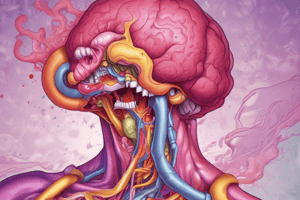Podcast
Questions and Answers
What is the primary cause of peptic ulcer?
What is the primary cause of peptic ulcer?
- Overproduction of gastrin
- Infection with H. pylori
- Smoking and environmental factors
- Imbalance between the damaging effects of gastric acid and pepsin, and the defense mechanisms (correct)
What is the effect of prostaglandin E2 on gastric acid secretion?
What is the effect of prostaglandin E2 on gastric acid secretion?
- Activates adenylyl cyclase
- Increases intracellular calcium levels
- Inhibits adenylyl cyclase (correct)
- Stimulates gastrin release
What is the role of somatostatin in gastric acid secretion?
What is the role of somatostatin in gastric acid secretion?
- Increases intracellular calcium levels
- Stimulates gastrin release
- Diminishes gastric acid production (correct)
- Activates adenylyl cyclase
What is the primary target of treatment for peptic ulceration?
What is the primary target of treatment for peptic ulceration?
What is the mechanism of action of histamine on gastric acid secretion?
What is the mechanism of action of histamine on gastric acid secretion?
What is the primary mechanism by which proton pump inhibitors irreversibly inactivate the Na+/K+ ATPase enzyme?
What is the primary mechanism by which proton pump inhibitors irreversibly inactivate the Na+/K+ ATPase enzyme?
What is the recommended timing for taking proton pump inhibitors to maximize their effect?
What is the recommended timing for taking proton pump inhibitors to maximize their effect?
Why should H2-receptor antagonists be taken after proton pump inhibitors?
Why should H2-receptor antagonists be taken after proton pump inhibitors?
What is a potential long-term consequence of prolonged hypochlorhydria induced by proton pump inhibitors?
What is a potential long-term consequence of prolonged hypochlorhydria induced by proton pump inhibitors?
What is a unique endocrine effect of cimetidine that is not seen with other H2-receptor antagonists?
What is a unique endocrine effect of cimetidine that is not seen with other H2-receptor antagonists?
Flashcards are hidden until you start studying
Study Notes
Peptic Ulcer
- Occurs due to an imbalance between aggressive factors (gastric acid and pepsin) and defensive mechanisms (gastric and duodenal mucosa)
- Major causes: NSAIDs use, especially in the elderly, and smoking
- Smoking is a major environmental factor, and patients should be advised to quit
Gastric Acid Secretion
- Secreted by parietal cells in gastric mucosa
- Stimulated by gastrin, histamine, and acetylcholine, which bind to receptors on basolateral membranes
- Inhibited by prostaglandin E2 and somatostatin
- Acetylcholine and gastrin increase intracellular calcium levels, while histamine activates adenylyl cyclase
Inhibition and Neutralization of Gastric Acid
- Proton pump inhibitors (PPIs): omeprazole, esomeprazole, lansoprazole, pantoprazole, and rabeprazole
- Mode of action: irreversibly inhibit Na+/K+ ATPase, reducing acid secretion
- Therapeutic uses: erosive esophagitis, active duodenal ulcer, Zollinger-Ellison syndrome, GERD, and H. pylori eradication
Proton Pump Inhibitors (PPIs)
- Omeprazole is a prodrug, which becomes ionized in acidic media and binds to sulphydryl groups on Na+/K+ ATPase
- Given in enteric-coated tablets due to degradation at low pH
- Adverse effects: nausea, headache, diarrhea, constipation, rash, and interactions with warfarin, diazepam, carbamazepine, and phenytoin
- Long-term use may increase risk of gastric carcinoid tumors, reduce vitamin B12 absorption, and increase susceptibility to GIT infections
H2 Receptor Antagonists
- Examples: cimetidine, ranitidine, famotidine, nizatidine
- Therapeutic uses: peptic ulcers, acute stress ulcers, and gastroesophageal reflux disease
- Adverse effects: headache, dizziness, diarrhea, muscular pain, CNS effects (confusion, hallucinations), and endocrine effects (antiandrogenic effects)
Studying That Suits You
Use AI to generate personalized quizzes and flashcards to suit your learning preferences.




